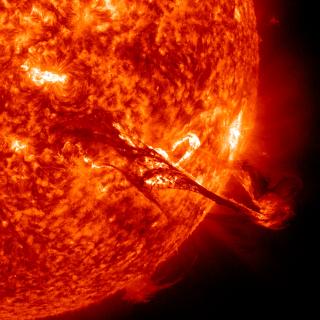Bibcode
Ruiz Cobo, B.; Quintero Noda, C.; Gafeira, R.; Uitenbroek, H.; Orozco Suárez, D.; Páez Mañá, E.
Referencia bibliográfica
Astronomy and Astrophysics
Fecha de publicación:
4
2022
Revista
Número de citas
35
Número de citas referidas
33
Descripción
Future ground-based telescopes, such as the 4-metre class facilities DKIST and EST, will dramatically improve on current capabilities for simultaneous multi-line polarimetric observations in a wide range of wavelength bands, from the near-ultraviolet to the near-infrared. As a result, there will be an increasing demand for fast diagnostic tools, i.e., inversion codes, that can infer the physical properties of the solar atmosphere from the vast amount of data these observatories will produce. The advent of substantially larger apertures, with the concomitant increase in polarimetric sensitivity, will drive an increased interest in observing chromospheric spectral lines. Accordingly, pertinent inversion codes will need to take account of line formation under general non-local thermodynamic equilibrium (NLTE) conditions. Several currently available codes can already accomplish this, but they have a common practical limitation that impairs the speed at which they can invert polarised spectra, namely that they employ numerical evaluation of the so-called response functions to changes in the atmospheric parameters, which makes them less suitable for the analysis of very large data volumes. Here we present DeSIRe (Departure coefficient aided Stokes Inversion based on Response functions), an inversion code that integrates the well-known inversion code SIR with the NLTE radiative transfer solver RH. The DeSIRe runtime benefits from employing analytical response functions computed in local thermodynamic equilibrium (through SIR), modified with fixed departure coefficients to incorporate NLTE effects in chromospheric spectral lines. This publication describes the operating fundamentals of DeSIRe and describes its behaviour, robustness, stability, and speed. The code is ready to be used by the solar community and is being made publicly available.
Proyectos relacionados

Magnestismo Solar y Estelar
Los campos magnéticos son uno de los ingredientes fundamentales en la formación de estrellas y su evolución. En el nacimiento de una estrella, los campos magnéticos llegan a frenar su rotación durante el colapso de la nube molecular, y en el fin de la vida de una estrella, el magnetismo puede ser clave en la forma en la que se pierden las capas
Tobías
Felipe García